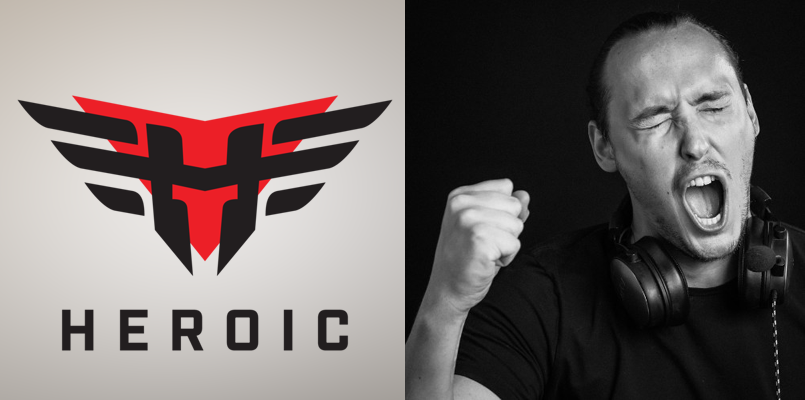Mentioned in this article
In November of 2018, RFRSH Entertainment sold one of its Counter-Strike: Global Offensive teams, Heroic, to Seranades Global Inc. The deal included a transfer of player contracts, licenses, trademarks, and brand rights in order to comply with WESA regulations regarding the ownership of multiple CS:GO teams.
Erik Askered, CEO of Heroic, was a partner at the esports division of talent agency CUBE. Nearly a year after the team’s acquisition, Askered spoke to The Esports Observer to share Heroic’s new beginnings, accomplishments, and hopes for the future.
“I was picked up in October for the sole purpose of running Heroic,” he said. “I’ve known the investor for quite some time, aiding him on how to best tap into esports. I got a phone call from him saying, ‘Erik you’re going to quit your job.’ And so, I did. And I’m super happy about it.”
While Heroic was an established brand under RFRSH, Askered noted that with the acquisition, he and his team were challenged with creating something new beyond just an updated logo. At the time, Heroic was known as the “little brother of Astralis,” i.e. the last remaining CS:GO team owned by RFRSH. That made it easier to stand out, in his opinion. (Astralis later separated from RFRSH).

In his first executive role, he and his team were tasked with creating a new organization from scratch.
“It was tough in the beginning,” he admitted. “I’m young and inexperienced—on the C-level, anyway—but I have [Aleksey “XAOC” Kucherov] who was the CEO of HellRaisers to help me. He’s my right-hand man, so to speak.”
Despite some reorganization, Heroic ranked as the world’s #12 CS:GO team in August. Askered is confident that with its current line-up, Heroic is capable of reaching #1.
Laying the Foundation for Success
A year into its new existence, Heroic is mainly focused on establishing a strong foundation and building a fanbase through online content. Using a small photography and editing team, the organization has published a series of videos that take viewers behind-the-scenes of events including IEM Chicago, ESL One Cologne, and the EPL Finals in Montpellier, France.

Credit: ESLHeroic now operates out of Copenhagen, which is also where the team’s training facility is located. Askered said that the team plans to get the players a personal trainer, and it will launch a clothing line soon.
Apparel will not be Heroic’s main revenue focus, although that could change in the future as it rolls out what he calls “a lot of kickass stuff.”
Facing the Future Head-On
For emerging Counter-Strike organizations like Heroic, 2020 could be a make or break year. ESL will be introducing its Pro Tour, promising teams more stability. If and when the circuit proves successful, Askered predicts, Valve might also be more inclined to invest in the game as it has with Dota 2 and The International.
The biggest hurdle facing competitive CS:GO is a transition from free viewership to pay-per-view, Askered observed.

“Everyone’s used to watching CS:GO for free,” he said. “Unless we have the huge media companies wanting to buy and monetize the esports spectrum on their channels on TV or through their streaming platforms, [esports is] going to see a huge decrease in viewership and money.”
Looking to the future, he hopes that esports will be structured more like traditional sports so that fans can enjoy competition in a myriad of ways.
“As a person very interested in esports and working in esports, I work so much but I never get to play,” Askered commented. “I could see myself buying a season pass for an ESL Pro Tour. We’re far away from that right now, but that’s where we need to be.”
This interview was conducted by Graham Ashton.

